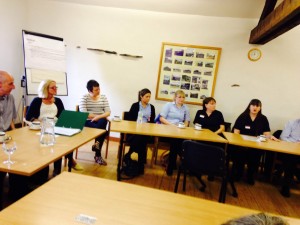The Registered Managers’ Programme from The National Skills Academy for Social Care aims to better equip Registered Social Care Managers to meet the challenges they face, to reduce their isolation by networking them at local and national level, and to enable them to recognise their leadership role. As part of the Programme, they are funding Local Networks to support Registered Managers on the ground, either where demand has been identified but no Network exists, or to strengthen and expand existing ones.
One such network has recently been established in Cumbria with support from the Social Care Workforce Research Unit at King’s College London, and it builds on earlier work around communities of practice. For more information contact michelle.cornes@kcl.ac.uk
This post was written by the members of the Cumbria Registered Social Care Managers’ Network following their meeting last month.
The focus of this meeting (4 June 2014) was celebrating the work of the huge number of social care workers who do a great job every day and make a really positive difference to the lives of people who need care and support. Inevitably though, the conversation moved to discussing the recent Panorama programme (Behind Closed Doors, 30 April 2014) on abusive care, and the impact programmes like this have on staff in the sector. That led to us thinking about what registered social care managers can do to raise the profile of care that is caring and compassionate?

The Cumbria Registered Social Care Managers’ Network at the June 2014 meeting
For the front-line care workers in attendance at this meeting, programmes like Behind Closed Doors are far removed from their day-to-day experiences of delivering care. A good day for some starts with crumpets, toast and jam and a chance to catch up with each other (called a ‘hand over’ in the jargon). There are enormous challenges in delivering good quality care—for example how to be personalised, compassionate and ‘quick’ (in your 15 minute time slot with each resident). Work is often stressful, physically demanding (12 hour shifts) and emotionally draining. Needless to say, the situation is not helped by the current climate of austerity and chronic underfunding. However, the job brings with it enormous rewards and a great sense of personal satisfaction. At the heart of the work is your team, like a family almost, and all the emotional benefits which flow from being collegiate.
Added to this, is the sense that you are making a very real and positive difference to people’s lives. In this business it is the ‘smiles and the thank yous’ that count for most… The six figure bonuses, pay rises, company cars and expenses said to be absolutely essential to recruit and retain the ‘best’ staff in the more compassionate(less) industries are seemingly not so important in social care. Maybe the city banks have something to learn from social care managers in this respect?

The Cumbria Registered Social Care Managers’ Network at the June 2014 meeting
Where programmes like Panorama can have a particularly detrimental impact is that they can work to undermine the confidence and integrity of some social care managers. The desire to ‘protect’ the public from abusive care often sees the inspectorates and commissioners of services imposing further layers of monitoring and regulation. However, unless carefully implemented as part of a wider culture of learning and improvement, this can quickly lead to a ‘them’ and ‘us’ scenario in which there is a lack of trust and authentic partnership working. While the ‘best managers’ will follow the rules and regulations, reporting ‘poor practices’ or any ‘safeguarding’ incidents as they are required to do, they can be left feeling demoralised and ‘brow beaten’ by the response. ‘Poor managers’ meanwhile will keep their heads down; they will not engage externally and will remain largely hidden from view, that is, until the television cameras go in.
How to engender trust and authentic relationships (the ‘smiles and the thank yous’) between commissioners and providers of social care services is a question we shall return to in future meetings. Celebrating the role of the social care worker and raising the profile of ‘good care’ has just been a first step.
For more information about this post please contact Michelle Cornes, Senior Research Fellow at the Social Care Workforce Research Unit at King’s College London. The Unit is part of The Policy Institute @ King’s.
 Action on Elder Abuse recently relaunched as
Action on Elder Abuse recently relaunched as  Caroline Norrie
Caroline Norrie 
